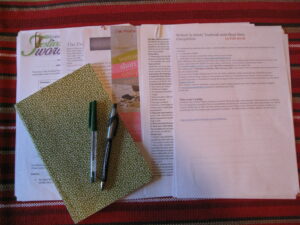April 2021: Competition Monthly
19 April 2021
When it comes to writing competitions, the saying ‘rules are meant to be broken’ isn’t at all helpful
 One of the most basic elements of competition participation is following the rules.
One of the most basic elements of competition participation is following the rules.
Having judged several competitions myself, I know how often rules are ignored. They’re not there to make it difficult for entrants, but to make it fair for them, and also easier for the administrators and judges.
One of the most common stipulations in a competition is that the work mustn’t have been published elsewhere. Very occasionally the administrators don’t mind this, but you’re usually asked to inform the organiser if your entry is placed elsewhere. More often though, it can’t even be currently entered into another comp, or ‘simultaneously submitted’ as it’s referred to. It might be tempting to think that they’ll never find out. But if you win, they might!
Sometimes you’re encouraged by discounts to send more than one entry to a contest. At other times you’re only permitted one bite at the cherry. If it’s the latter and you submit more, your subsequent entries will be disqualified – and you won’t get your money back.
If the rules state not to put your name on your entry, then make sure it’s not on a header or footer you’ve overlooked. It’s easily done.
Occasionally a competition is only open to a certain group of people, most commonly to do with age, gender or ethnicity, or you need to live in a certain part of the UK. Quite a number of comps, though open to all, will have a local prize (like in the Aurora Prize below). If you live in the qualifying area, make sure you let the organisers know this.
Though literary prizes are generally open to published and unpublished writers alike, some ask only for entrants who are either one or the other. This is the case in the Storyhouse competition below, which is for unpublished writers. If you’re not clear on whether they’re referring to all writing or just novels (as often ‘unpublished’ doesn’t include short stories), send them an email or message to clarify.
More on rules next month.
Happy writing, and I wish you all success in your comping endeavours.
Click March 2021 for posts detailing further competitions closing in May.
*
Rolling Competitions
Writers’ Forum
Theme: Open, 1,000 – 3,000 words
Prizes: £300 / £150 / £100
Closing date: Rolling
Entry: £3 subscribers / £6 non
Closing soon
Wasafari New Writing Prize
Theme: Open, 3,000 words max. Writer must not be traditionally published in a book length work.
Prizes: £1,000
Closing date: 31 May 2021, 5pm
Entry: £10
June Competitions
Aurora Prize for Writing
Theme: Open, 2,000 words max.
Prizes: £500, feedback and membership of Society of Authors / £150 / One day course of choice / Local East Midlands prize £100
Closing date: 7 June 2021
Entry: £7 subscribers / £9 non
Writing Magazine Food Writing Competition
Theme: Fiction or nonfiction, to evoke the senses with food, 1,500 – 1,700 words
Prizes: £200 plus publication in Writing Magazine / £50 plus publication online
Closing date: 15 June 2021
Entry: £7.50 / £5 for subscribers
The Hummingbird Flash Fiction Prize
Theme: Open, 1,000 words max.
Prizes: CAN$300
Closing date: 15 June 2021
Entry: $20 (Early bird $15).
Segora Short Story Competition
Theme: Open, 1,500 words max.
Prizes: £300 / £100 / £50
Closing date: 15 June 2021
Entry: £8
Segora Vignette Competition
Theme: Open, 300 words max.
Prizes: £100 / £50
Closing date: 15 June 2021
Entry: £5
Segora One-Act Play Competition
Theme: For any medium, running time 10 – 35 minutes
Prizes: £150 / £50
Closing date: 15 June 2021
Entry: £12
The British Fantasy Society Short Story Competition
Theme: Any kind of fantastical story, 5,000 words max.
Prizes: £100 / £50 / £20
Closing date: 30 June 2021
Entry: £5
The Lascaux Prize in Flash Fiction
Theme: Open, 1,000 words max.
Prizes: £1,000 / £100 for finalists
Closing date: 30 June 2021
Entry: US$15
William Van Wert Award for Fiction
Theme: Any unpublished story or a novel excerpt, no longer than 25 pages.
Prizes: US$1,000
Closing date: 30 June 2021
Entry: US$17
Storyhouse General Nonfiction Competition
Theme: Must be true, not ‘creative nonfiction’, from unpublished writers.
Prizes: US200 / $100
Closing date: 30 June 2021
Entry: Free
Wells Festival of Literature Short Story Competition
Theme: Open, 1,000 – 2,000 words
Prizes: £750 / £300 / £200 / Local prize £100
Closing date: 30 June 2021
Entry: £6
Wells Festival Book for Children Competition
Theme: Aimed at 7+: middle grade or teens. First 2 chapters or 20 pages plus a synopsis.
Prizes: £750 / £300 / £200
Closing date: 30 June 2021
Entry: £6
Flash 500 Flash Fiction Competition
Theme: Open, 500 words max
Prizes: £300 / £200 / £100
Closing date: 30 June 2021 (and quarterly thereafter)
Entry: £5 (£8 for 2)
Writing Magazine Grand Prize
Theme: Open, 1,000 – 3,000 words
Prizes: £1,000 / £250 / £100
Closing date: 30 June 2021
Entry: £15 / £10 for subscribers
*
 Francesca Capaldi Burgess has been placed or shortlisted in a dozen competitions including Winchester Writers’ Conference, Retreat West, Meridian Writing, Wells Festival Book for Children, Writing Magazine and The People’s Friend serial competition. She’s had stories published in magazines worldwide along with several pocket novels. Currently she’s writing the third episode of her World War 1 Valleys series, set in Wales and published by Hera Books. Francesca runs a writing blog with RNA member Elaine Roberts called Write Minds.
Francesca Capaldi Burgess has been placed or shortlisted in a dozen competitions including Winchester Writers’ Conference, Retreat West, Meridian Writing, Wells Festival Book for Children, Writing Magazine and The People’s Friend serial competition. She’s had stories published in magazines worldwide along with several pocket novels. Currently she’s writing the third episode of her World War 1 Valleys series, set in Wales and published by Hera Books. Francesca runs a writing blog with RNA member Elaine Roberts called Write Minds.



